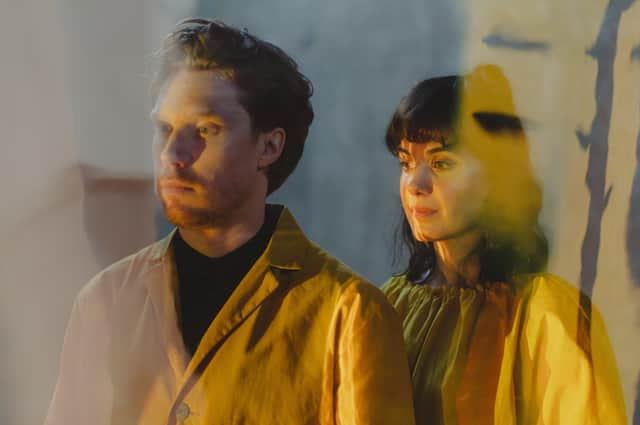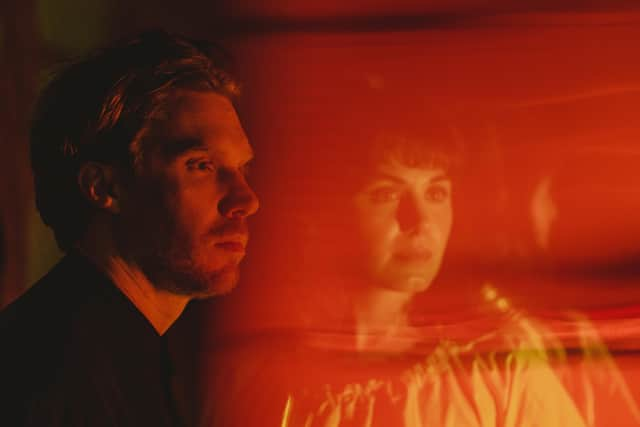Katie Melua and Simon Goff: On the making of Aerial Objects


Yet such is the changed musical climate in the wake of the pandemic that when Melua reached out to Goff in 2021, having been impressed by his contemporary classical-meets-ambient-electronica album Vale, the idea of reworking a couple of songs from her Album No 8 was met with open arms.
A year on, comes a full-blown songwriting collaboration, called Aerial Objects.
Advertisement
Hide AdAdvertisement
Hide AdDiscussing the album via Zoom from their respective homes in London and Berlin, Melua and Goff make for genial company, politely taking it in turns to answer questions about how the project came about.
Melua talks of her “visceral” response to Goff’s album when was given a copy by a friend at her record label. “I found it musically truly exquisite, like it was lifting me up, it was just completely changing my mood and the sounds felt very much like you were inside the orchestra,” she says. “It’s difficult in classical music to get the violin to sound so gritty. I know Warren Ellis does that brilliantly with Nick Cave, but I just found it exquisite, so I was curious to work with Simon.”
Goff explains Vale had been inspired by his fondness for Yorkshire landscapes, having been brought up in Thirsk and later moving to Leeds. “When I wrote Vale it was very much a thing of I’d left Leeds and moved to Berlin and I wanted to re-set a little bit,” he says. “I’d just come out of studying the violin at Birmingham Conservatoire and I wanted to find a place where I could open the space up.
“I was part of some quite formulated scenes in the UK and while there are many people who find space in between those scenes, for myself it felt like there was a space opening for me to go to Berlin and find this ground that was a bit more fertile for my own exploration, so I came over here with the purpose of trying something new and to examine my own relationship to the violin which I’d been studying and playing all of my life, and then meeting lots of people in Berlin who worked in this classical experimental scene.
Advertisement
Hide AdAdvertisement
Hide Ad“So when I was writing Vale I was looking back at my own history of music and growing up in Yorkshire, close to the North Yorkshire Moors, going onto the Moors and as a child being in the Dales and what learning music growing up in that kind of environment meant to the way that I saw the world. These landscapes are just there and I think it really impacted me, then being in a city in Berlin and connecting with people here, just the merger of those two experiences. That’s what I was looking for in Vale, to let that out through music.”


Now 37, Melua says that as “lucky” as she has been in a 20-year musical career that includes two No 1 albums in the UK, she has come to realise “that you can’t ever stay still...you have to move forward, you have to find new ground”. While reworking her own songs Remind Me To Forget and Maybe I Dreamt It with Goff for her acoustic record, she “loved the way that he was completely fluid in the studio, there was no divide between the composition and the technology and things were created in a very inspired and fast way but with so much heart and emotion to it”. When Goff suggested they try writing together on “pieces that are experimental and not part of any existing world that either of us had worked in”, it immediately appealed.
Goff says the process was “totally organic – it was just let’s get in a room and make some music”, adding that BMG jumped on board after hearing their first couple of songs. “It’s just been one of those things where it’s been purely interest, exploration and just fun and diving into something then the opportunities have opened up in front of us and we’ve just let them go and followed them and seen how it’s developed,” he says.
The pair did not set themselves any formal rules, but quickly came to respect each other’s fortes. “I realised that Simon, what he does with the violin and the studio, is an art in its own thing, so I did not actually get too involved in the musical composition apart from giving some topline vocal melodies,” Melua says. “Simon was very generous and he completely opened the door and said, ‘Give me feedback’, but ultimately he was in charge of the music then equally Simon gave me dominion over the lyrics.”
Advertisement
Hide AdAdvertisement
Hide AdShe says she loved how quickly they came upon the album’s concept “which was to examine memories and spaces and who what surrounds us influences how we feel, what they do to our sense of self and our understanding of the world and ourselves”.
“Right at the beginning one of the interests was to go places that were unusual and unexpected for us,” adds Goff. “For my side of it, when I started writing with Katie I wanted to stay away from the four-bar, eight-bar systems of pop music and try and see what happens if you don’t do that. When we were improvising, there was very much the idea in my head of OK, if there was ever a moment where we think we’re about to land, go somewhere different...I think that defined the sound of the record quite early because it had this fluidity to it, this constant movement and it gave us a space that felt very exciting and different to stuff that we’d both done before.”
The albums opening track Tibilisi Airport was the first song they wrote together. Georgia-born Melua says she finds airports “massively” evocative places. “I’m an immigrant child, I was eight years old when we moved from Georgia to the UK, and even as an adult where airports essentially became the place where I would go to work the most often, there was never really a routine, but airports were my office,” she says. “Now, since the pandemic, I do find a romance about them, I love how vast those spaces are and the design of airports, and just the experience of getting into a plane and flying out into the clouds and then you see the world through these little windows and most of the time the air stewardesses look very nice. Just the whole experience, and the madness of being lifted up from the ground. I find them very inspiring.”
“Airports are such a strange place,” says Goff. “We’ve discussed the experience of being in them. For me to be honest, airports feel very much like purgatory. They’re this place where you’re not going anywhere yet. You’ve arrived from somewhere but you’re waiting to go somewhere else. I’m sure we’ve all had recent experience of sitting there for hours waiting to see whether the plane is actually going to leave, so it definitely has a strange vibe, but at the same time being a musician and touring they are often places where you share time with other musicians. It’s a kind of tour time, it’s a unique experience to share with somebody where you’ve got nothing to do but be with other people and talk about certain things. It’s the same experience as being on a tour bus travelling, there’s a very specific feeling to that time.”
Advertisement
Hide AdAdvertisement
Hide AdThe song It Happened pays homage to the German architects Herman Mathies and Werner Dutman and the Werkbund movement that preceded Bauhaus “and this idea in Germany after the Industrial Revolution a lot of German artists were worried about quality going out of the window in industrial scale”. “I found it fascinating this idea of how to make amazing spaces for the masses,” Melua says.
Textures of Memories meanwhile was inspired by New York. Goff talks of the city being “a special place” where he went after he graduated. “There was a period of two years where I was travelling around a lot between Yorkshire, Berlin and New York,” he says. “I actually spent my 25th birthday there and in that time ended up meeting a lot of people from the downtown arts scene like Phil Niblock. I went to John Cage’s apartment to do some work with the John Cage Foundation and I saw La Monte Young’s Dream House. There was a lot of this 60s/70s history of New York, coming out of studying classical music where I’d started to be exposed to this stuff, and got absorbed into it. Then shortly after ending up in Berlin, this lineage of things really impacted me.”
“It’s definitely a place that really marks your memory,” agrees Melua. “I’ll never forget what the light did in New York. Those huge, tall buildings and the light moving through and making them come alive.”
The closing track Millions of Things was prompted by Nicholas Crane’s book, The Making of the British Landscape, and its mention of Doggerland, the now submerged region that once linked Britain to continental Europe. Subtle parallels are drawn with modern-day politics. “It was an interesting part of the book but it wasn’t something that was going to be shied away from,” Goff smiles. “The symbolism of this project and connecting back with the UK since it left the EU. It’s been a very different experience living in Berlin. I moved here a couple of years before it was happening, so it’s really been a narrative of my experience of Berlin and whatever your opinion is on that in the last few years. A calamity would be my opinion, but it’s nice for me to be now connected back to the UK through working with Katie.”
Advertisement
Hide AdAdvertisement
Hide Ad“I didn’t know reading that book that there was a piece of land, it’s not actually that far down, Ithought it was fascinating,” says Melua. “I also love the fact that we open the record with an airport setting and we finish with the formation of an entire nation’s geography. The man-made versus the natural surroundings I thought was really fascinating. I also love the way Nic used language in that book the way, what words are capable of, how they can paint pictures that can span millions of years.”
The pair both seem open to further collaborations and even live shows. “When you meet someone and you have fun and the result is good, why would you not the door open for more?” says Goff.
Aerial Objects is out on Friday July 15. katiemelua.com
Comment Guidelines
National World encourages reader discussion on our stories. User feedback, insights and back-and-forth exchanges add a rich layer of context to reporting. Please review our Community Guidelines before commenting.